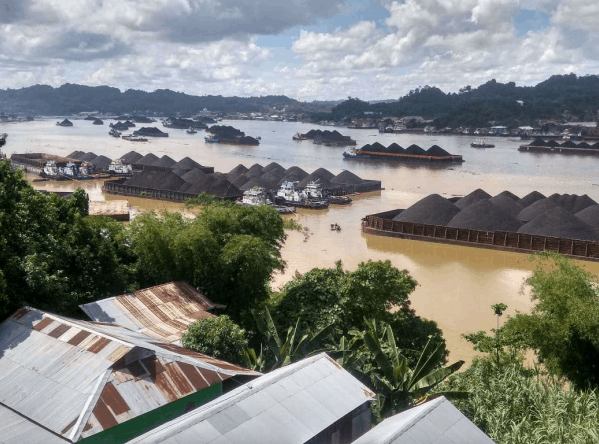Indonesian Parliament plenary session for the 2019-2024 term was held in mid-December 2019. They agreed to the draft of Law Amendment No/4/2009 on Mineral and Coal Mining (Minerba Bill). That bill is one of 248 bills which included as a National Legislation Program (Prolegnas) 2020-2024. The Chairperson of the Indonesian House of Representatives Commission 7 targets that Minerba Bill would be completed before August 2020.[1] This process is known will be carried out through a carry-over mechanism.
The stipulation of Minerba Bill is a continuation after previously became Prolegnas 2015-2019. On September 24, 2019 Minerba Bill was highlighted by mass demonstration at the House of Representatives Indonesia along with the pressure to stop Corruption Eradication Commission (KPK) Bill. That Action caused President which represented by Ministry of Energy and Mineral Resources (ESDM) at that time, Ignatius Jonas, sending a letter to DPR RI to stop and postpone Revision Bill to the next period.
Along with this issue, Publish What You Pay (PWYP) Indonesia together with the Coalition of Concern Society on Minerba Bill held a Public Discussion with the topic “Revision on Mineral and Coal Mining Law: Industry and Other Stakeholder Perspectives” on Monday (20/1), at Balai Kartini, Jakarta. This second session presents Dr. Alexander Sonny Keraf, The State Minister for Environment of the Republic of Indonesia period 1999-2001 who was also a Member of the Indonesian House of Representatives 2004-2009, beside of experts, actors, and the representatives of civil society organization focuses on mining governance issues.
In his presentation, Sonny Keraf said he felt sad by the statement of the government official who explained about coal production that did not meet the national economic scale. As a Chair of the Working Committee on Minerba Law and a person who was actively involved in the drafting of the National Energy General Plan (RUEN), he considered that the statement violated the mandate of Act and tended to voicing entrepreneur’s interest. According to him, coal production at that time had been limited to 400 million tons. “Why 400 million tons? Because our calculations were based on all permits granted at that time with a total production 400 million tons, thus no more permits could be issued” he said. He regretted the government policy which then increased the quota to 550 million tons in 2020 and could even potentially reach 700 million tons. “It indicates that the government is controlled by market or business interests.” He Said.
Also, the spirit of mining governance based on the philosophical of Pancasila and Article 33 of the 1945 Constitution must be carried out for the maximum welfare of the people. This value, Sonny Keraf said, could implemented through the change from the contract regime to the permit. “This is important to emphasize the sovereignty of our country”. Furthermore, land area and the concession period must be adjusted to the mandate of the Act with giving priority to State-Owned Enterprises (BUMN) as well as Regionally-Owned Enterprises (BUMD).
The drafting process of Minerba Bill ten years ago has a dynamic that is inseparable from the context of the mining industry in Indonesia. This was conveyed by Singgih Widagdo, Chairperson of the Natural Resources at IAGI (Indonesian Geologist Association). “In 2009,” said Singgih, “the coal business in Indonesia experienced a significant development. In 1991, Indonesia only peaked as the 5th coal exporter in the world.” This inflicts a crucial question of whether there will be a paradigm shift from exploitative for income to the development of energy sovereignty and mineral resources.
Djoko Widajatno, Executive Director of IMA (Indonesian Mining Association) presenting their academic study results on Law No.4/2009 which was not well implemented. This causes chaos and disorder on legal relations, thus the goals and benefits of law (legal justice and legal certainty) cannot be achieved. As an industry player, he hopes that there will be major changes to the Minerba Law onwards. Contrary perspective was conveyed by Ishaak, a representative of the Association of Indonesian Manufacturing and Refining Industries (AP3I), who considered it unnecessary because AP3I was more focused on industrial field. However, he added, “some AP3I members claimed they have experienced problems in the licensing aspect.”
Meanwhile, Merah Johansyah, National Coordinator of JATAM (Mining Advocacy Network) stressed the damaging impact of mining activity. He gives example what happens at his village, Samarinda, East Kalimantan, where there is a river called Mahakam turn dirty caused by coal transportation activity because there is around 90 to 100 boat of coal as known as Tongkang which operate daily.

To the government, Merah reminds the importance of carrying environment capacity in granting concession. It is crucial for sustainable environment in a region, besides consideration on disaster-prone. Also, Merah criticized the government’s performance on recovery, rehabilitation, and reclamation, which did not reach the target. “During 2014-2019, there were 140 people killed in mining pits which 35 of them occur at the coal mining pits in Samarinda, and the majority are children” (WC/AA).
[1] Anisatul Umah. (2019). Ketua Komisi VII DPR Targetkan RUU Minerba Kelar Agustus 2020. (December 11, 2019. (https://www.cnbcindonesia.com/news/20191211185848-4-122342/ketua-komisi-vii-dpr-targetkan-ruu-minerba-kelar-agustus-2020)